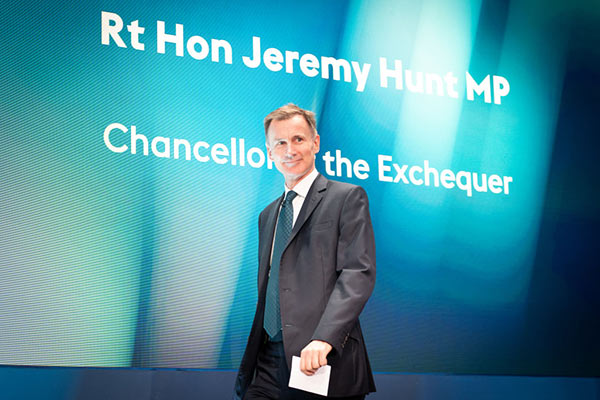Spring Budget 2024 preview: what might we expect?
Jeremy Hunt will step up to the despatch box in less than three weeks’ time. While cuts to income tax and inheritance tax are reportedly on the chancellor’s radar, his scope might be restricted.
15th February 2024 10:48
by Craig Rickman from interactive investor

The stakes appear higher than usual for this year’s Spring Budget.
Jeremy Hunt will outline the government’s tax and spending plans to the House of Commons on 6 March, in what could be a last-gasp bid to woo voters before a general election. This has fuelled the prospect, and perhaps hope, of crowd-pleasing tax giveaways.
- Our Services: SIPP Account | Stocks & Shares ISA | See all Investment Accounts
The chancellor has been vocal about his desire to deliver tax cuts, but headroom seems limited. The International Monetary Fund (IMF) recently warned Hunt against looser fiscal policy, implying the focus should be on economic growth rather than political ambitions.
Others have echoed the IMF’s concerns. Bloomberg economists fear lower taxes could reignite inflation and subsequently reverse falling mortgage rates, which could inflame rather than alleviate the strain on household finances.
Hunt has conceded the government’s purse strings are tighter than he would like. However, he struck a similarly guarded tone in the lead-up to last year’s final fiscal event, the Autumn Statement, yet cut taxes for workers and businesses.
Confirmation that the UK fell into technical recession last year may prove a further obstacle, but the chancellor remained positive, saying: “We expected growth to be weaker while tackling high inflation.”
Regardless, the rumour mill for this year’s Spring Budget is slowly cranking up, so here are five things reportedly on the table.
1) Inheritance tax shake-up
Potential reforms to inheritance tax (IHT) surfaced a few days before last year’s Autumn Statement. The most extreme suggestion was to abolish the tax, while a cut to the top rate from 40% to either 30% or 20%, and raising the tax-free thresholds were also rumoured.
While changes to IHT failed to materialise, many at the time thought the chancellor might keep the shake-up in his back pocket to form the centrepiece of this year’s Spring Budget.
Government sentiment on IHT leaves little to the imagination. Last month Hunt described it as “pernicious” and the Telegraph reported last summer that more than 50 Conservative MPs urged the chancellor to kibosh IHT.
Interestingly, though only one in 20 estates pay IHT, it’s a deeply unpopular tax, so any positive reform may find favour with voters.
Annual IHT payments are on a sharp upwards trajectory with frozen tax-free thresholds catching more families in its net. The latest HMRC data revealed receipts between April and December 2023 hit £5.7 billion - a £0.4 billion uptick on the same period the year before.
So, what changes could we see to IHT?
Scrapping the tax seems more aspirational than realistic. But cuts to the headline rate and simplifying the tax-free thresholds are possible.
The nil rate band (NRB), the value of your estate that you can pass on tax-free, has been frozen at £325,000 since 2009. Meanwhile, the residence nil rate band (RNRB), which can give homeowners an extra £175,000 each, is arguably both unfair and needlessly complicated.
To qualify, the home must be passed to children or grandchildren, penalising those who choose not to have kids, while the RNRB reduces by £1 for every £2 an estate exceeds £2 million.
Scrapping the RNRB and boosting the NRB to £500,000 would make things simpler and fairer. This would allow all married couples and civil partnerships, including those who are childfree and/or rent, to pass on £1 million tax-free.
2) Great British ISA
The government tinkered with individual savings account (ISA) rules last year, but the changes (which come in force from April) were modest rather than radical. And the latter is what savers and investors need.
The ISA landscape has become increasingly complex in recent years, with six types now in operation. As ii’s head of pensions and savings Alice Guy notes: “The more investment wrappers placed in front of potential savers, the fewer of them will actually benefit from saving and investing for their future.”
A policy that wasn’t included in the Autumn Statement but is still on the table is a Great British ISA. The policy aims to give savers an extra £5,000 allowance to invest in UK-listed shares - boosting the annual limit to £25,000 - in a bid to back British businesses.
- Fund firm calls for new ISA to just invest in UK shares
- Which ISA should I choose for my financial goals?
However, the government is split on the idea, according to the Telegraph; Hunt is in favour, describing a Great British ISA as “very attractive”, while Rishi Sunak needs convincing.
As only 15% of investors max out their £20,000 ISA allowance every year, this is not a policy that would benefit the masses.
That said, some extra allowance to keep wealth from the taxman wouldn’t do savers any harm, and you could argue an uptick is long overdue given the ISA limit hasn’t changed since 2017.
It would, of course, be simpler to boost the annual limit to £25,000 and allow investors to place the money wherever they like. Not least because those wealthy enough to fund the extra allowance may water-down UK exposure in other parts of their portfolios to avoid too much home bias.

3) Cuts to income tax (or further cuts to NI..)
Another pre-Autumn Statement rumour that didn’t come to pass was cuts to income tax. The government instead opted to slash national insurance (NI), but there are reports that Hunt may reduce the basic rate of income tax from 20% to either 19% or 18% next month.
Wielding the axe to income tax would indeed grab the headlines: cutting the basic rate to 19% would benefit more than 30 million taxpayers and could be worth over £5 billion for workers, savers and pensioners. What’s more, 19% would be the lowest the basic rate has ever been in the modern income tax system, making for a persuasive election pitch.
Other reports suggest Hunt may further cut employee NI, though this would not benefit the self-employed and retirees.
But any cuts to income tax or NI tax would be counteracted to some degree by frozen thresholds – otherwise known as fiscal drag – which are set to remain in place until 2028.
The effects of fiscal drag cannot be understated. You may notice it’s a theme that recurs throughout this article.
- Fiscal drag due to cost taxpayers up to £4,000 by 2027
- Which taxes pose the greatest threat to your wealth?
Figures underscore the threat it poses. More than four million people have been dragged into paying income tax since 2020 and 1.6 million more people have tripped into the 40% tax bracket. These volumes will continue to rise over the coming years unless the government rows back on its decision to keep tax thresholds static.
4) Child benefit reform
Child benefit is a valuable source of income for parents of young children. The current rates are £24 a week for the eldest child and £15.90 a week for every other child. This means a family with two kids will pocket £2,074.80 (£1,248 + £826.80) a year.
There is, however, a catch. For every £100 one partner earns above £50,000 they face a 1% charge on child benefit payments. This is called the High-Income Child Benefit Charge.
Once income hits £60,000, the charge equals the child benefit received, effectively wiping it out and creating a 60% tax trap.
Critics argue that the charge is unfair, and it’s easy to see why.
First, a couple who each earns £50,000 swerves the charge. However, a couple where one earns £60,000 and the other nothing would effectively lose child benefit – despite their annual household income being £40,000 less than the first example.
Second, the £50,000 threshold has been frozen for 11 years. As wages have risen during this period, more families have been pulled into paying the charge, in yet another example of fiscal drag in action.
When quizzed on the matter on ITV’s Martin Lewis Money Show last month, Hunt conceded that “there is a very big distortion in the marginal rate of tax that people earn, and I fully accept there is an unfairness with what happens with dual income families”.
The chancellor added: “All I will say is this is one of many distortions in our overcomplicated tax system that I look at. There are lots of things I would like to change. If it is affordable, I will do so, but it is too early to tell at this stage.”
5) Help for house buyers
Reports surfaced in the late December that help for first-time buyers was on the government’s radar. Budding homeowners face steep barriers as the combination of toppy property prices and higher interest rates continue to squeeze affordability.
To give first-time buyers a leg-up, the government is apparently considering a couple of measures. The first is a scheme for longer fixed-term mortgages, while the second is to resurrect the help-to-buy scheme, which enabled aspiring homeowners to buy their first home with a deposit as low as 5%.
Making improvements to the Lifetime ISA could also help. The maximum property value has remained at £450,000 since the product was launched in 2017, despite house prices rising sharply during this period. What’s more, there’s a hefty 25% penalty if you access the money early.
During his conversation with Martin Lewis last month, Hunt hinted that changes to the Lifetime ISA could be announced next month.
Things will change between now and 6 March…
With most fiscal events, the firmer rumours emerge a few days before the chancellor stands up in Parliament.
We must also consider that Sunak could wait until after this year’s Autumn Statement (held every November) to call an election, giving the government another bite of the cherry to get voters onside.
But there is a sense the Conservative Party may need to pull some rabbits out of the hat at the Spring Budget or resign itself to losing power.
These articles are provided for information purposes only. Occasionally, an opinion about whether to buy or sell a specific investment may be provided by third parties. The content is not intended to be a personal recommendation to buy or sell any financial instrument or product, or to adopt any investment strategy as it is not provided based on an assessment of your investing knowledge and experience, your financial situation or your investment objectives. The value of your investments, and the income derived from them, may go down as well as up. You may not get back all the money that you invest. The investments referred to in this article may not be suitable for all investors, and if in doubt, an investor should seek advice from a qualified investment adviser.
Full performance can be found on the company or index summary page on the interactive investor website. Simply click on the company's or index name highlighted in the article.
Important information: Please remember, investment values can go up or down and you could get back less than you invest. If you’re in any doubt about the suitability of a Stocks & Shares ISA, you should seek independent financial advice. The tax treatment of this product depends on your individual circumstances and may change in future. If you are uncertain about the tax treatment of the product you should contact HMRC or seek independent tax advice.